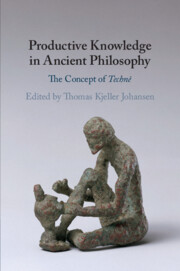Book contents
- Productive Knowledge in Ancient Philosophy
- Productive Knowledge in Ancient Philosophy
- Copyright page
- Contents
- Contributors
- Acknowledgements
- List of Abbreviations
- Introduction
- Chapter 1 Protagoras on Political Technê
- Chapter 2 Dynamic Modalities and Teleological Agency
- Chapter 3 Technê As a Model for Virtue in Plato
- Chapter 4 Crafting the Cosmos
- Chapter 5 Aristotle on Productive Understanding and Completeness
- Chapter 6 Technê and Empeiria
- Chapter 7 The Stoics on Technê and the Technai
- Chapter 8 The Epicureans on Technê and the Technai
- Chapter 9 The Sceptic’s Art
- Chapter 10 Plotinus on the Arts
- Chapter 11 Productive Knowledge in Proclus
- Bibliography
- General Index
- Index Locorum
Chapter 6 - Technê and Empeiria
Aristotle on Practical Knowledge
Published online by Cambridge University Press: 14 January 2021
- Productive Knowledge in Ancient Philosophy
- Productive Knowledge in Ancient Philosophy
- Copyright page
- Contents
- Contributors
- Acknowledgements
- List of Abbreviations
- Introduction
- Chapter 1 Protagoras on Political Technê
- Chapter 2 Dynamic Modalities and Teleological Agency
- Chapter 3 Technê As a Model for Virtue in Plato
- Chapter 4 Crafting the Cosmos
- Chapter 5 Aristotle on Productive Understanding and Completeness
- Chapter 6 Technê and Empeiria
- Chapter 7 The Stoics on Technê and the Technai
- Chapter 8 The Epicureans on Technê and the Technai
- Chapter 9 The Sceptic’s Art
- Chapter 10 Plotinus on the Arts
- Chapter 11 Productive Knowledge in Proclus
- Bibliography
- General Index
- Index Locorum
Summary
This chapter offers a fresh account of Aristotle's contribution to the long debate in antiquity among philosophers, rhetoricians and medical writers concerning the relative merits, or demerits, of accumulated experience (empeiria) and of theoretical know-how (technê) as powers for successful practical action. In pursuing this topic, Bolton offers an extensive investigation of the relation between the account of these powers offered by Aristotle in Metaphysics I.1 and that found in the Nicomachean Ethics. He carefully distinguishes the different notion of universal that are available to Aristotle in characterizing the object of technê, arguing that the notion of universal underlying Aristotle’s account of technê in Metaphysics I.1 is the one we find in the Posterior Analytics, thereby giving us a theoretically flavoured notion of technê. However, this notion is not generally presupposed by the accounts we find elsewhere in the Aristotelian corpus. Particularly, in the Topics a different conception of technê emerges as empeiria or experience, an account which coincides with those defended by the later medical empiricists.
- Type
- Chapter
- Information
- Productive Knowledge in Ancient PhilosophyThe Concept of <I>Technê</I>, pp. 131 - 165Publisher: Cambridge University PressPrint publication year: 2021
- 3
- Cited by

